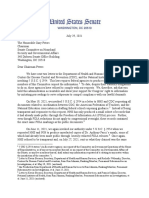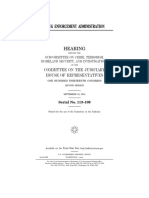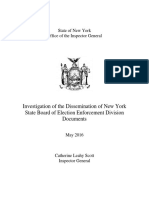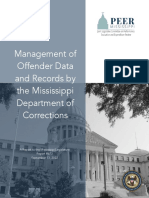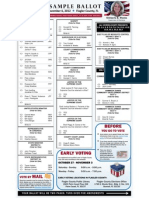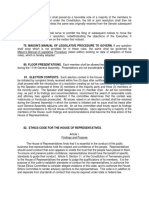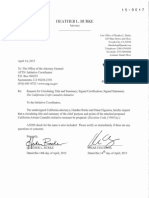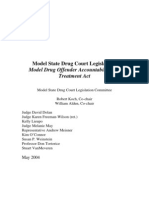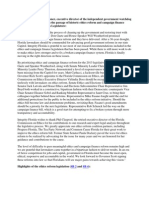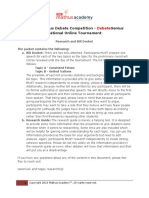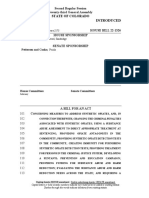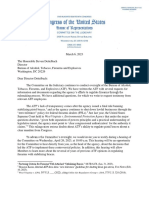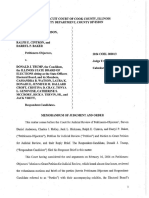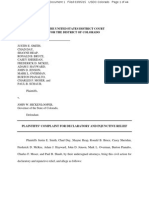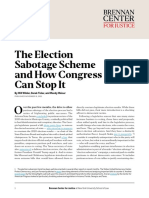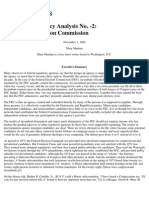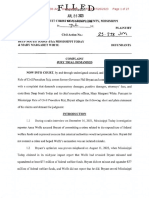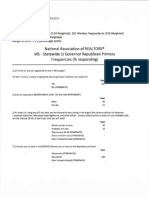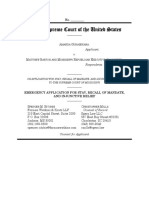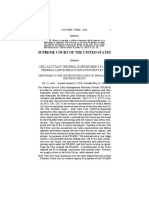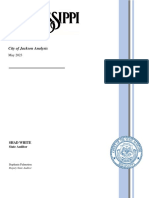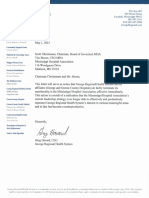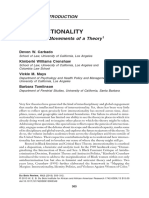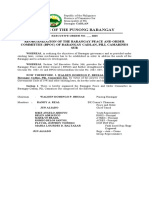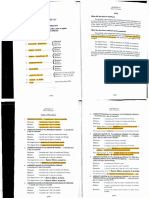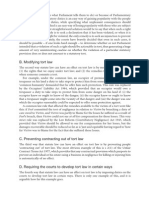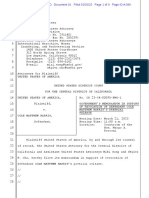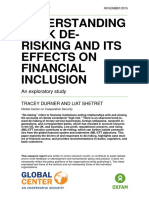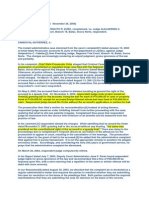RPT 680
RPT 680
Uploaded by
Russ LatinoCopyright:
Available Formats
RPT 680
RPT 680
Uploaded by
Russ LatinoOriginal Description:
Original Title
Copyright
Available Formats
Share this document
Did you find this document useful?
Is this content inappropriate?
Report this DocumentCopyright:
Available Formats
RPT 680
RPT 680
Uploaded by
Russ LatinoCopyright:
Available Formats
A Review of Parker’s Law
Convictions
PEER Issue Brief #680 1
Issue Brief #680
December 13, 2022
About PEER:
PEER Committee
The Mississippi Legislature created the Joint
Legislative Committee on Performance Evaluation and
Kevin Blackwell, Chair Expenditure Review (PEER Committee) by statute in
1973. A joint committee, the PEER Committee is
Jerry Turner, Vice-Chair composed of seven members of the House of
Becky Currie, Secretary Representatives appointed by the Speaker of the
House and seven members of the Senate appointed by
the Lieutenant Governor. Appointments are made for
four-year terms, with one Senator and one
Senators: Representative appointed from each of the U.S.
Congressional Districts and three at-large members
Lydia Chassaniol
appointed from each house. Committee officers are
Dean Kirby elected by the membership, with officers alternating
Chad McMahan annually between the two houses. All Committee
Sollie Norwood actions by statute require a majority vote of four
Representatives and four Senators voting in the
John Polk
affirmative.
Charles Younger
Mississippi’s constitution gives the Legislature broad
power to conduct examinations and investigations.
PEER is authorized by law to review any public entity,
Representatives: including contractors supported in whole or in part by
public funds, and to address any issues that may
Richard Bennett
require legislative action. PEER has statutory access to
Cedric Burnett all state and local records and has subpoena power to
Carolyn Crawford compel testimony or the production of documents.
Timmy Ladner PEER provides a variety of services to the Legislature,
Percy Watson including program evaluations, economy and
efficiency reviews, financial audits, limited scope
evaluations, fiscal notes, and other governmental
research and assistance. The Committee identifies
Executive Director: inefficiency or ineffectiveness or a failure to accomplish
James F. (Ted) Booth legislative objectives, and makes recommendations for
redefinition, redirection, redistribution and/or
restructuring of Mississippi government. As directed by
and subject to the prior approval of the PEER
Committee, the Committee’s professional staff
executes audit and evaluation projects obtaining
information and developing options for consideration
by the Committee. The PEER Committee releases
reports to the Legislature, Governor, Lieutenant
Governor, the agency examined, and the general
public.
The Committee assigns top priority to written requests
from individual legislators and legislative committees.
2 The Committee also considers
PEER IssuePEER staff proposals
Brief #680
and written requests from state officials and others.
A Review of Parker’s Law Convictions
Issue Brief #680 | December 13, 2022
Scope and Authority
As required by MISS. CODE ANN. Section 41-29-139.1 (1972), otherwise known as Parker’s Law, the PEER
Committee prepared the following:
• An overview of Parker’s Law, and similar provisions of law in the United States; and,
• The number of convictions that have occurred under Parker’s Law since its adoption.
Background
The Requirements of Parker’s Law
In 2022, the Mississippi Legislature adopted Chapter 401, Laws of 2022, otherwise known as Parker’s Law.
Section 2 of this legislation provides:
(1) A person who delivers or causes the delivery of fentanyl with knowledge of the fentanyl
commits the crime of "fentanyl delivery resulting in death" when as a result of the unlawful
delivery of fentanyl in exchange for anything of value to another person, death to a person
results from the proximate cause of injection, oral ingestion or inhalation of the fentanyl.
Upon conviction for violating the provisions of this section, the person shall be sentenced
to imprisonment no less than twenty (20) years to a term of life in the custody of the
Mississippi Department of Corrections.
(2) For purposes of this act only, any person, who, in good faith, without malice and in the
absence of evidence of an intent to defraud, seeks medical assistance for someone
experiencing a fentanyl overdose shall not be charged or prosecuted for a violation of this
section, if the evidence for the charge was gained as a result of the seeking of medical
assistance.
(3) For purposes of this act:
(a) "Fentanyl" means fentanyl and any fentanyl-related substances, to include
fentanyl analogs, as set forth in Article 3, Chapter 29 of Title 41 of the Mississippi
Code of 1972.
(b) "In exchange for anything of value" does not apply to the act of sharing
fentanyl when the sharing results in the proximate cause of a person's death under
this section.
(4) The legislative intent for this bill is to assist in prosecuting any person who sells or
otherwise profits from the sale of unlawful fentanyl, which causes the death of another
person. It is not the intent of this Legislature for the provisions of this section to be used
to prosecute a drug user or drug addict who has shared fentanyl with a friend or associate
and the friend or associate dies as a result of the sharing.
PEER Issue Brief #680 3
(5) The provisions of this section shall not be construed to limit, restrict or otherwise
prohibit an indictment or conviction for any other crime that may be related to a violation
of this section.
(6) The Joint Legislative Committee on Performance Evaluation and Expenditure Review
shall create an annual report of the number of persons convicted under the provisions of
this act; and shall provide the report to the House and Senate Judiciary B committees by
January 5, of each year.
(7) This section shall stand repealed from and after July 1, 2025.
This provision of law was codified as MISS. CODE ANN. Section 41-29-139.1 (1972).
The Fentanyl Problem
Parker’s Law was adopted as a response to the growing problem of Fentanyl use and addiction. According
to the U.S. Department of Health and Human Services, overdose deaths resulting from synthetic opioids
such as Fentanyl have increased 97-fold from since 1999. Exhibit 1 below illustrates the number of drug
overdose deaths in the U.S. from 1999 to 2021.
Exhibit 1: Drug Overdose Deaths in the U.S. from 1999 to 2021
SOURCE: U.S. Department of Health and Human Services, “Overdose Prevention Strategy.”
Pharmaceutical fentanyl is a synthetic opioid,
More than 56,000 people died from overdoses
approved for treating severe pain, typically
involving synthetic opioids in 2020.
advanced cancer pain. It is 50 to 100 times more
potent than morphine. It is prescribed in the form of
transdermal patches or lozenges and can be diverted for misuse and abuse in the United States. However,
most recent cases of fentanyl-related harm, overdose, and death in the U.S. are linked to illegally made
4 PEER Issue Brief #680
fentanyl. It is sold through illegal drug markets for its heroin-like effect. It is often mixed with heroin and/or
cocaine as a combination product—with or without the user’s knowledge—to increase its euphoric effects.
Rates of overdose deaths involving synthetic opioids other than methadone, which includes fentanyl and
fentanyl analogs, increased by more than 56% from 2019 to 2020. The number of overdose deaths
involving synthetic opioids in 2020 was more than 18 times the number in 2013. More than 56,000 people
died from overdoses involving synthetic opioids in 2020. The latest provisional drug overdose death
counts through June 2021 suggest an acceleration of overdose deaths during the COVID-19 pandemic.1
Criminal Penalties for Drug-induced Homicides
The use of criminal statutes to punish those who distribute controlled substances to persons who die from
the use of such substances is not new in this country. A 2017 report shows that 20 states and the federal
government have adopted statutes that make it a felony to distribute a controlled substance to a person
who ultimately dies from the use of that substance.2
Since that date, at least one state, Tennessee, has adopted a criminal provision that is similar to
Mississippi’s.3 That section provides:
(a) Second degree murder is:
(1) A knowing killing of another;
(2) A killing of another that results from the unlawful distribution of any Schedule
I or Schedule II drug, when the drug is the proximate cause of the death of the
user; or
(3) A killing of another by unlawful distribution or unlawful delivery or unlawful
dispensation of fentanyl or carfentanil, when those substances alone, or in
combination with any substance scheduled as a controlled substance by the
Tennessee Drug Control Act of 1989, compiled in chapter 17, part 4 of this title
and in title 53, chapter 11, parts 3 and 4, including controlled substance analogs,
is the proximate cause of the death of the user.
(b) In a prosecution for a violation of this section, if the defendant knowingly engages in
multiple incidents of domestic abuse, assault or the infliction of bodily injury against a
single victim, the trier of fact may infer that the defendant was aware that the cumulative
effect of the conduct was reasonably certain to result in the death of the victim, regardless
of whether any single incident would have resulted in the death.
(c) (1) Second degree murder is a Class A felony.
(c) (2) Notwithstanding the Tennessee Criminal Sentencing Reform Act of 1989, compiled
in title 40, chapter 35, a person convicted of a violation of subdivision (a)(2) where the
victim is a minor shall be punished from within one (1) range higher than the sentencing
range otherwise appropriate for the person.4
1
“Fentanyl,” Centers for Disease Control and Prevention, June 1, 2022.
2
“An Overdose Death is not Murder,” Dru Policy Alliance, November 2017.
3
Tenn. Code Section 39-13-211.
4
Class A felonies in Tennessee are punishable by a prison sentence of 15 to 60 years and fines of up to $50,000.
PEER Issue Brief #680 5
Convictions under Parker’s Law
Because Parker’s law has only been in effect PEER staff contacted the Administrative Office of
since July 1, 2022, there have been no the Courts (AOC) to determine how many
convictions. convictions have occurred under Parker’s Law since
its adoption. The staff of AOC reviewed court
records in their possession, including filings maintained in Mississippi Electronic Courts (MEC). To date,
the AOC has not recorded a conviction under Parker’s Law. AOC and PEER emphasize that the provisions
have only been in effect since July 1, 2022.
6 PEER Issue Brief #680
James F. (Ted) Booth, Executive Director
Legal and Reapportionment Performance Evaluation
Barton Norfleet, General Counsel Lonnie Edgar, Deputy Director
Ben Collins Jennifer Sebren, Deputy Director
Kim Cummins
Matthew Dry
Matthew Holmes
Administration Drew Johnson
Kirby Arinder Billy Loper
Stephanie Harris Debra Monroe-Lax
Gale Taylor Taylor Mullins
Meri Clare Ringer
Sarah Williamson
Julie Winkeljohn
Quality Assurance and Reporting Ray Wright
Tracy Bobo
Hannah Jane LeDuff
PEER Issue Brief #680 7
A Review of Parker’s Law Convictions
December 13, 2022
For more information, contact: (601) 359-1226 | P.O. Box 1204, Jackson, MS 39215-1204
Senator Kevin Blackwell, Chair | James F. (Ted) Booth, Executive Director
8 PEER Issue Brief #680
You might also like
- Faulkner Act 46pages PDFDocument48 pagesFaulkner Act 46pages PDFKing PennaNo ratings yet
- PEER On PERSDocument44 pagesPEER On PERSRuss LatinoNo ratings yet
- PEER On PERSDocument44 pagesPEER On PERSRuss LatinoNo ratings yet
- HHS Withholding Info On Fauci Wuhan Letter - Sens. Johnson Paul Lankford Scott and Hawley To Chairman Gary PetersDocument4 pagesHHS Withholding Info On Fauci Wuhan Letter - Sens. Johnson Paul Lankford Scott and Hawley To Chairman Gary PetersJim Hoft100% (4)
- DHS AuditDocument100 pagesDHS Auditthe kingfish100% (1)
- CAOA Detailed SummaryDocument30 pagesCAOA Detailed SummarySinclair Broadcast Group - EugeneNo ratings yet
- CISA Exam - Free Questions and Answers - ITExamsDocument10 pagesCISA Exam - Free Questions and Answers - ITExamsAntar Shaddad0% (2)
- House Hearing, 113TH Congress - Drug Enforcement AdministrationDocument59 pagesHouse Hearing, 113TH Congress - Drug Enforcement AdministrationScribd Government DocsNo ratings yet
- E2ssb 5036Document8 pagesE2ssb 5036Tasha Cain100% (1)
- PEER Report On MDOCDocument16 pagesPEER Report On MDOCRuss LatinoNo ratings yet
- (DAILY CALLER OBTAINED) - 2023-07-11 JDJ To Granger - AppropriationsDocument11 pages(DAILY CALLER OBTAINED) - 2023-07-11 JDJ To Granger - AppropriationsHenry RodgersNo ratings yet
- 7omcb170 PDFDocument6 pages7omcb170 PDFCraig O'DonnellNo ratings yet
- PEER Report On MDOC Electronic MonitoringDocument54 pagesPEER Report On MDOC Electronic MonitoringRuss Latino100% (1)
- Sorrell Investigation ReportDocument14 pagesSorrell Investigation ReportAnonymous 2zbzrvNo ratings yet
- Boe Report5.31.16Document13 pagesBoe Report5.31.16Nick ReismanNo ratings yet
- PEER On MDOCDocument93 pagesPEER On MDOCRuss LatinoNo ratings yet
- Flagler 2012 Sample BallotDocument2 pagesFlagler 2012 Sample BallotFlagler County DECNo ratings yet
- Legislative Wrap Up February 18-22Document7 pagesLegislative Wrap Up February 18-22delegatearoraNo ratings yet
- Rule 82 of Permanent Rules of The TN HouseDocument8 pagesRule 82 of Permanent Rules of The TN HouseFOX 17 NewsNo ratings yet
- Con Law 1 HyposDocument9 pagesCon Law 1 HyposSarah BryanNo ratings yet
- Dr. Ram Manohar Lohia National Law University, Lucknow Civil Society and Public GrievancesDocument15 pagesDr. Ram Manohar Lohia National Law University, Lucknow Civil Society and Public GrievancesBharat Joshi100% (1)
- California Craft Cannabis InitiativeDocument13 pagesCalifornia Craft Cannabis InitiativeYubaNetNo ratings yet
- ModelStateDCLegislationDocument104 pagesModelStateDCLegislationlosangelesNo ratings yet
- Sources of Administrative Power: Marcelino C. Cabucana, JRDocument24 pagesSources of Administrative Power: Marcelino C. Cabucana, JRCieloNo ratings yet
- SB2 SB4Document3 pagesSB2 SB4Integrity FloridaNo ratings yet
- Debate Tournament Docket - ResearchDocument7 pagesDebate Tournament Docket - ResearchDivineDoctorNo ratings yet
- Legislative BranchDocument13 pagesLegislative BranchJan-nah LakimNo ratings yet
- PEER On Transportation DOMDocument61 pagesPEER On Transportation DOMRuss LatinoNo ratings yet
- FLARA - Resolution On Ethics in Florida Government 06.11.12Document2 pagesFLARA - Resolution On Ethics in Florida Government 06.11.12Integrity FloridaNo ratings yet
- Internal Test - Remedies in TortsDocument5 pagesInternal Test - Remedies in TortsRONSHA ROYS ANNANo ratings yet
- Colorado House Bill 22-1326Document43 pagesColorado House Bill 22-1326Michael_Roberts2019No ratings yet
- LEGISLATIVE DEPARTMENT ReviewerDocument7 pagesLEGISLATIVE DEPARTMENT ReviewerJica Rose Antog ParokNo ratings yet
- Letter To AG Herring Re ACRJ Release Notification - 12-17-18Document22 pagesLetter To AG Herring Re ACRJ Release Notification - 12-17-18Will LysterNo ratings yet
- Justice Act (Just and Unifying Solutions To Invigorate Communities Everywhere)Document15 pagesJustice Act (Just and Unifying Solutions To Invigorate Communities Everywhere)acohnthehillNo ratings yet
- Florida Con LawDocument55 pagesFlorida Con LawPaulMarieNo ratings yet
- 2020-21 Set 1Document4 pages2020-21 Set 1redlichanNo ratings yet
- Congress Request ATF Director Steve Dettlebach TestifyDocument2 pagesCongress Request ATF Director Steve Dettlebach TestifyAmmoLand Shooting Sports NewsNo ratings yet
- 1 Political Law 7.1.2019Document27 pages1 Political Law 7.1.2019Analyn TaguilingNo ratings yet
- FCEB Report On November 2013 General Election For Board RatificationDocument33 pagesFCEB Report On November 2013 General Election For Board RatificationnormanomtNo ratings yet
- Legislators and Their Legal ResearchDocument8 pagesLegislators and Their Legal ResearchsamanthaNo ratings yet
- Supreme Court of India Page 1 of 21Document21 pagesSupreme Court of India Page 1 of 21nkhahkjshdkjasNo ratings yet
- Dd15e02b FullDocument38 pagesDd15e02b Fulled2870winNo ratings yet
- Voter RightDocument6 pagesVoter RightsayanmaldihaNo ratings yet
- Legislative Wrap-Up: Library and Information Services, Department of Legislative ServicesDocument10 pagesLegislative Wrap-Up: Library and Information Services, Department of Legislative ServicesdelegatearoraNo ratings yet
- Complaint For Judicial Review Pursuant Interface 12cv3789Document5 pagesComplaint For Judicial Review Pursuant Interface 12cv3789Charles GleasonNo ratings yet
- Sheriffs Sue Colorado Over Legal MarijuanaDocument44 pagesSheriffs Sue Colorado Over Legal MarijuanaMarijuana MomentNo ratings yet
- Marijuana LawsuitDocument44 pagesMarijuana LawsuitColoradoanNo ratings yet
- Lawyers Against Monopoly and Poverty (Lamp) vs. The Secretary of Budget and Management, GR No. 164987 April 24, 2012Document7 pagesLawyers Against Monopoly and Poverty (Lamp) vs. The Secretary of Budget and Management, GR No. 164987 April 24, 2012Ashley Kate PatalinjugNo ratings yet
- The Election Sabotage Scheme and How Congress Can Stop ItDocument9 pagesThe Election Sabotage Scheme and How Congress Can Stop ItThe Brennan Center for Justice100% (1)
- Analysis of Law 50-88Document16 pagesAnalysis of Law 50-88ScribdTranslationsNo ratings yet
- Micromash Condensed Complete Outline and Exam AlertsDocument312 pagesMicromash Condensed Complete Outline and Exam Alertsrhino79100% (4)
- Political and International LawDocument26 pagesPolitical and International LawFairy MenesesNo ratings yet
- Genuino v. de Lima - Fuentes v. OmbudsmanDocument30 pagesGenuino v. de Lima - Fuentes v. OmbudsmanJude Thaddeus DamianNo ratings yet
- The Federal Election Commission, Cato Policy AnalysisDocument11 pagesThe Federal Election Commission, Cato Policy AnalysisCato InstituteNo ratings yet
- 2014-2017 Poli Q&aDocument55 pages2014-2017 Poli Q&aFrancesca Isabel Montenegro100% (2)
- Cannabis Therapy Institute Petition To Department of Revenue For Emergency RulesDocument7 pagesCannabis Therapy Institute Petition To Department of Revenue For Emergency RulesNickNo ratings yet
- Pennsylvania Legislature v. Joe Biden, Josh ShapiroDocument33 pagesPennsylvania Legislature v. Joe Biden, Josh ShapiroThe FederalistNo ratings yet
- June 24, 2008: Statements by Dea Before CongressDocument55 pagesJune 24, 2008: Statements by Dea Before CongressSTOUFFLET JusticeNo ratings yet
- 6488d68ecaba2f00185f0619 - ## - Polity 42 Daily Class Notes UPSC Sankalp HinglishDocument5 pages6488d68ecaba2f00185f0619 - ## - Polity 42 Daily Class Notes UPSC Sankalp HinglishPrajwal GoteNo ratings yet
- Examining the Evolving Ethical Environment Within the Minnesota State Senate and House of RepresentativesFrom EverandExamining the Evolving Ethical Environment Within the Minnesota State Senate and House of RepresentativesNo ratings yet
- DOJ Langston-Farese-GattoDocument33 pagesDOJ Langston-Farese-GattoNick PopeNo ratings yet
- U.S. Department of Education Response To IHL - October 31, 2023Document4 pagesU.S. Department of Education Response To IHL - October 31, 2023Russ LatinoNo ratings yet
- Wingate Status Conference Response - Jackson WaterDocument7 pagesWingate Status Conference Response - Jackson WaterRuss LatinoNo ratings yet
- FY 25 Final Action Budget Top Sheet 5.4.24Document2 pagesFY 25 Final Action Budget Top Sheet 5.4.24Russ LatinoNo ratings yet
- Bryant MT ComplaintDocument27 pagesBryant MT Complaintthe kingfishNo ratings yet
- PEER Report On MDOC Electronic MonitoringDocument54 pagesPEER Report On MDOC Electronic MonitoringRuss Latino100% (1)
- Magnolia Tribune-Mason Dixon Governor's Poll (October 2023)Document7 pagesMagnolia Tribune-Mason Dixon Governor's Poll (October 2023)Russ LatinoNo ratings yet
- Madison Mayor Sues Three SupervisorsDocument19 pagesMadison Mayor Sues Three SupervisorsAnthony WarrenNo ratings yet
- Teacher Prep Review - Strengthening Elementary Reading InstructionDocument105 pagesTeacher Prep Review - Strengthening Elementary Reading InstructionRuss LatinoNo ratings yet
- Order Dismissing Randolph - NAACP v. ReevesDocument24 pagesOrder Dismissing Randolph - NAACP v. ReevesRuss LatinoNo ratings yet
- The Cost of "Diversity, Equity, and Inclusion" Programs at Mississippi Public UniversitiesDocument322 pagesThe Cost of "Diversity, Equity, and Inclusion" Programs at Mississippi Public UniversitiesRuss Latino0% (1)
- NAR Lt. Governor's Poll (May 22-24, 2023)Document12 pagesNAR Lt. Governor's Poll (May 22-24, 2023)Russ LatinoNo ratings yet
- Office of Compulsory School Attendance Enforcement & Dropout Prevention Homeschool Enrollment Report 2018-2022Document6 pagesOffice of Compulsory School Attendance Enforcement & Dropout Prevention Homeschool Enrollment Report 2018-2022Russ LatinoNo ratings yet
- Gunasekara SCOTUS Appeal May 2023Document46 pagesGunasekara SCOTUS Appeal May 2023Russ LatinoNo ratings yet
- H.B. 1020 AppealDocument10 pagesH.B. 1020 AppealAnthony WarrenNo ratings yet
- SCOTUS On National Guard FLRA CaseDocument23 pagesSCOTUS On National Guard FLRA CaseRuss LatinoNo ratings yet
- HB 1020 Appeal 1Document2 pagesHB 1020 Appeal 1Russ LatinoNo ratings yet
- OSA City of Jackson Analysis PDFDocument7 pagesOSA City of Jackson Analysis PDFthe kingfishNo ratings yet
- Hosemann Letter To Secretary WatsonDocument7 pagesHosemann Letter To Secretary WatsonRuss LatinoNo ratings yet
- Revenue Report April 2023-1Document8 pagesRevenue Report April 2023-1Russ LatinoNo ratings yet
- Intent To Sue LetterDocument7 pagesIntent To Sue LetterRuss LatinoNo ratings yet
- UMMC, MHA Termination LetterDocument1 pageUMMC, MHA Termination LetterRuss LatinoNo ratings yet
- MHA Termination Letter - May 8, 2023 - Mississippi Hospital AssociationDocument1 pageMHA Termination Letter - May 8, 2023 - Mississippi Hospital AssociationRuss LatinoNo ratings yet
- OSA 2019 Single AuditDocument424 pagesOSA 2019 Single AuditRuss LatinoNo ratings yet
- 192 Drafted Amended First Complaint WMDocument94 pages192 Drafted Amended First Complaint WMthe kingfishNo ratings yet
- Memorial MHA Termination 05-01-23Document1 pageMemorial MHA Termination 05-01-23Russ LatinoNo ratings yet
- Singing River MHADocument1 pageSinging River MHARuss LatinoNo ratings yet
- MHA Membership TerminationDocument1 pageMHA Membership TerminationRuss LatinoNo ratings yet
- Balite DecDocument75 pagesBalite DecAngelika CalingasanNo ratings yet
- Carbado, Crenshaw, Mays & Tomlinson (2013) IntersectionalityDocument11 pagesCarbado, Crenshaw, Mays & Tomlinson (2013) IntersectionalitySolSomozaNo ratings yet
- Themes: Loyalty To Family Versus Loyalty To The LawDocument3 pagesThemes: Loyalty To Family Versus Loyalty To The LawLorenaNo ratings yet
- CrimPro FinalsDocument14 pagesCrimPro FinalsJoy Montecalvo100% (1)
- Responses For Guardian StoryDocument5 pagesResponses For Guardian StoryTechCrunchNo ratings yet
- NSFAS 2020 Applications Consent Form PDFDocument1 pageNSFAS 2020 Applications Consent Form PDFBadi BadirileNo ratings yet
- Final Sample E GS 2 BPSC MainsDocument28 pagesFinal Sample E GS 2 BPSC MainsAman guptaNo ratings yet
- 02 - Bpoc 2023Document2 pages02 - Bpoc 2023Kimberly Bring100% (1)
- Comments and Jurisprudence On Obligations and Contracts by JuradoDocument715 pagesComments and Jurisprudence On Obligations and Contracts by JuradoKadzNitura100% (1)
- E GorvernanceDocument246 pagesE GorvernanceAlain BogneNo ratings yet
- RPC - Scale of PenaltiesDocument7 pagesRPC - Scale of PenaltiesJM SisonNo ratings yet
- The Law Enforcement Strength Weakness Opportunity ThreatDocument3 pagesThe Law Enforcement Strength Weakness Opportunity ThreatAphze Bautista Vlog100% (1)
- Osstmm (Open Source Security Testing MethdologyDocument16 pagesOsstmm (Open Source Security Testing MethdologyKuros4kiNo ratings yet
- Sequatchie County From 05-02-2012 To 05-05-2012 File 1Document5 pagesSequatchie County From 05-02-2012 To 05-05-2012 File 1dunlaptattlerNo ratings yet
- B. Modifying Tort Law: Cowardice (Imposing Statutory Duties Is An Easy Way of Gaining Popularity With The PeopleDocument1 pageB. Modifying Tort Law: Cowardice (Imposing Statutory Duties Is An Easy Way of Gaining Popularity With The PeopleShalini AriyarathneNo ratings yet
- Government's Memorandum in Support of Revocation of Cole Harris Pretrial ReleaseDocument9 pagesGovernment's Memorandum in Support of Revocation of Cole Harris Pretrial ReleaseJennifer Van LaarNo ratings yet
- Essay 2 FinalDocument8 pagesEssay 2 Finalapi-582043599No ratings yet
- Santosh Kumar Vs State Through CbiDocument6 pagesSantosh Kumar Vs State Through CbiDiwanshu KaRwalNo ratings yet
- Affidavit of Discrepancy in Name: Linda S. AndalesDocument3 pagesAffidavit of Discrepancy in Name: Linda S. AndalesLejonav RegninNo ratings yet
- Mexico 2022 Human Rights ReportDocument46 pagesMexico 2022 Human Rights ReportAristegui NoticiasNo ratings yet
- 1 Republic Vs Eugenio, G.R. No. 174629 February 14, 2008Document3 pages1 Republic Vs Eugenio, G.R. No. 174629 February 14, 2008Perry YapNo ratings yet
- People Vs Baula Et AlDocument2 pagesPeople Vs Baula Et AlStef BernardoNo ratings yet
- A Treatise On Arrest Complaint PDFDocument16 pagesA Treatise On Arrest Complaint PDFNat Williams100% (3)
- Andrei Merlescu: Director of Project AparioDocument3 pagesAndrei Merlescu: Director of Project AparioPintu PontuNo ratings yet
- Understanding Bank De-Risking and Its Effects On Financial Inclusion: An Exploratory StudyDocument57 pagesUnderstanding Bank De-Risking and Its Effects On Financial Inclusion: An Exploratory StudyOxfamNo ratings yet
- Alain Touraine, Anton Oleinik - Organized Crime, Prison and Post-Soviet Societies (Routledge Revivals) (2017, Routledge) - Libgen - LiDocument326 pagesAlain Touraine, Anton Oleinik - Organized Crime, Prison and Post-Soviet Societies (Routledge Revivals) (2017, Routledge) - Libgen - LiGuilherme Rodrigues LeiteNo ratings yet
- People v. RullepaDocument31 pagesPeople v. RullepaMariline Lee0% (1)
- Zuno Vs Cabebezuno Vs CabebeDocument4 pagesZuno Vs Cabebezuno Vs CabebeEmil BautistaNo ratings yet
- Malware AnalysisDocument4 pagesMalware Analysispratik karguppikarNo ratings yet


